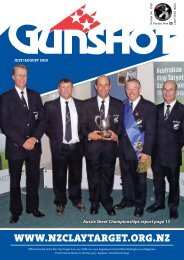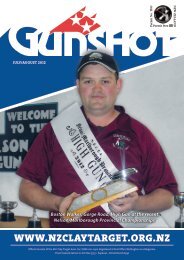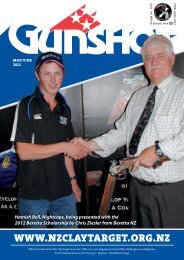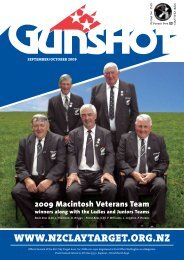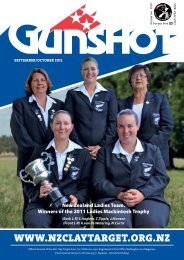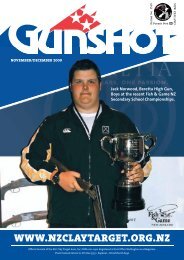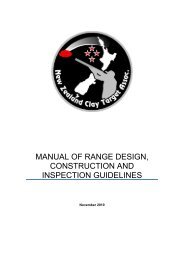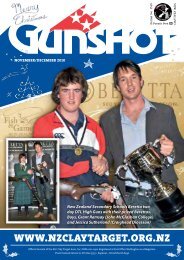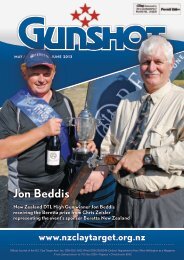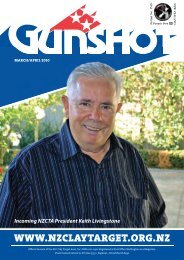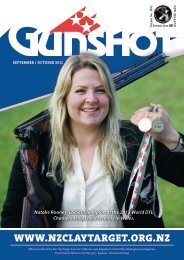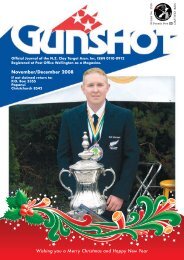March/April 2009 - New Zealand Clay Target Association
March/April 2009 - New Zealand Clay Target Association
March/April 2009 - New Zealand Clay Target Association
Create successful ePaper yourself
Turn your PDF publications into a flip-book with our unique Google optimized e-Paper software.
MENTAL TRAINING<br />
PractiSe<br />
by Michael J. Keyes, M.D.<br />
I was listening to a musician talk about practise on the radio<br />
the other day and he brought up a good point: “When you<br />
practise, you have to face yourself and deal with the pain.”<br />
What he meant, of course, is if you want your practise to mean<br />
anything, you have to be honest and realistic. Practise is not<br />
meant to be fun.<br />
There are plenty of reasons to practise. Most shooters have a<br />
natural ability to hit targets. We call this the “talent level,” but<br />
shooting in competition is not a natural endeavour. Shotgun<br />
shooting is a distillation of the normal ability to hit a moving<br />
target that places demands on the shooter hunting or plinking<br />
do not. One of these is the need to be perfect.<br />
On the hunting field, we don’t usually count the number of<br />
shots we take to down birds (unless there is money involved,<br />
of course, and then it becomes a competition). We are there<br />
to have a good time, be outdoors and commune with nature,<br />
which is the essence of hunting. It is different when we pay<br />
money to shoot clay targets in order to win a prize.<br />
We practise so we can win, and to win we have to have a plan<br />
and a direction to travel. Practise is serious business.<br />
To practise well, you have to determine what is the most efficient<br />
way to go about the task and then have to do the practise.<br />
Every elite-level shooter practises that way, while the rest of us<br />
tend to not really practise. Instead, we want to have fun.<br />
There is nothing wrong with having fun. If you ask those elite<br />
shooters if they are enjoying their practise rounds, they will<br />
tell you they are having fun. The reason they are having fun<br />
is they are convinced they are going to win, and one of the<br />
reasons they think that is they practise harder and better than<br />
99% of all the other shooters.<br />
“Easy” Ed Macauley used to say, “When you are not practising,<br />
remember, someone somewhere is practising and, when you<br />
meet him, he will win.” Elite-level shooters know talent is<br />
trumped by hard work. And that hard work involves a large<br />
dose of reality.<br />
The problem with having fun at practise is, while you are<br />
having fun, you are not looking at your weak spots. Instead,<br />
you are ignoring anything that might cause you to feel bad<br />
about yourself or your game. In this case, having fun is a<br />
recipe for disaster if you intend to improve. You don’t really<br />
want to look at what your problems are and then fix them. You<br />
would rather shoot a round of (insert shotgun game) with your<br />
friends and enjoy the day.<br />
If you have been reading this column on a regular basis, you<br />
will know I advocate an organised approach to shooting, and<br />
especially to practise. Each practise session should have an<br />
immediate goal based on a recent analysis of your game and<br />
should fit in with your overall goals, resulting in improvement.<br />
Every time you shoot in practise, you should attempt to solve a<br />
problem in your game. You have to have a ruthlessly accurate<br />
idea of where you stand and where you are going to do this.<br />
That means looking at your failures and admitting to yourself<br />
you are not perfect. A lot of us have a very hard time with<br />
this.<br />
Elite-level shooters analyze their faults on a regular basis.<br />
They are aware perfection is a moving target, and they have<br />
to keep at a peak when they shoot in important matches if<br />
they want to win. Part of this focus is to acknowledge there<br />
are weak areas in their game that have to be improved and<br />
strong areas that can be exploited. Any problems have to be<br />
solved by eliminating them. At this level, it usually only takes<br />
a short time to resolve the issue because they have done it so<br />
many times in the past.<br />
Beginning and intermediate shooters have a different set of<br />
problems. They are not perfect, not even close, and have<br />
multiple technical, physical and mental issues, most they are<br />
not even aware of. Technical skills are usually the focus of<br />
their practise.<br />
One advantage a beginning or intermediate shooter has is<br />
they know they need improvement and can follow standard<br />
and obvious practise patterns, such as shooting so many<br />
shots at each station of a ‘skeet field’ while learning the proper<br />
setup, lead and follow-through. Coaches, books and friends<br />
can guide them (meaning, they can point out the mistakes<br />
and prescribe cures) and usually put the shooter on the right<br />
path. All the shooter has to do is accept they need this kind of<br />
help and practise to minimize the bad stuff while enhancing<br />
the good stuff.<br />
Of course, that is a lot harder than it sounds. It is hard to<br />
accept you are not perfect. It hurts to realise you are a failure<br />
in any respect if you are the typical perfectionist workaholic<br />
that tends to become a competitor. But it is necessary if you<br />
want to advance to the top. Accepting this is Step One in<br />
practising.<br />
Step Two is to practise well. Learning to practise is an art in<br />
itself. You would think just going out and shooting 200 rounds<br />
focusing on some aspect of your shooting would be enough.<br />
But practise is about information processing. You have to take<br />
a number of related concepts and form them into a functioning<br />
whole that will prove itself in a match.<br />
There are some things about a match you cannot duplicate in<br />
practise (match stress, for one), yet you have to devise a way<br />
to overcome the obstacles anyway. Fortunately, your brain<br />
is capable of making the connections in a way that allows<br />
you to improve even with incomplete information. Ideally,<br />
you should be able to go to a tournament, deal with match<br />
pressure and automatically shoot your shots to the best of<br />
your current ability. You should shoot with confidence and<br />
not be surprised by anything that occurs at the match. Your<br />
performance should be a reflection of your performance in<br />
practise. If it isn’t, you are not practising as well as you can.<br />
We all know shooters who shoot much better in practise than<br />
matches. Something is clearly wrong with this picture, but the<br />
shooter usually can’t tell you what is wrong. I will venture to<br />
say anyone who is finding himself with this problem is not<br />
practising to overcome it. Instead, they are expecting to do<br />
well because they have the technical skill or talent and believe<br />
they will succeed without having to put in the work required<br />
to perform well in a match. They refuse to look at their<br />
deficiencies, especially those aspects of mental toughness<br />
lacking in their game. It is not that they cannot develop<br />
these qualities, they are just not willing to do the mental and<br />
emotional work needed to make sure they have the confidence<br />
to succeed under match pressure.<br />
The brain is capable of overcoming any of these obstacles. All<br />
it takes is making the right choices and hard work. The work<br />
part is essential because you have to push yourself in order to<br />
change. Most of us can’t do something once and be an expert<br />
at it forever after; we have to dissect it mentally, put in the<br />
time doing the physical part and then sleep on it.<br />
Practise demands hard work, but it also requires rest time for<br />
the brain to process and integrate the information to make it<br />
a complete concept that can be brought into use in a match.<br />
Gunshot 44



